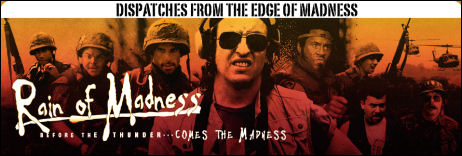It’s icky to make news stories out of evidence that famous people are infidels, but every time I read one — example #1, example #2 — I feel mildly comforted on some level. I despise these stories and half-like them at the same time.
Recap: Slate‘s Mickey Kaus has printed yesterday morning’s memo from L.A. Times editor Tony Pierce which noted that “because the only source [on the John Edwards-Rielle Hunter affair] has been the National Enquirer, we have decided not to cover the rumors or salacious speculations, so I am asking you all not to blog about this topic until further notified.” The Enquirer is apparently intending to publish photos of Edwards running away from photographers when they ambushed him at the Beverly Wilshire earlier this week.
Not Funny, Man
Why is the new Will Ferrell-John C. Reilly comedy called Step Brothers? I’ve known that stepbrothers is a single unhyphenated word since I took part in sixth-grade spelling bees. Is your mother’s mother your “grand mother” or “grandmother”? I hate how marketing guys always do it their own way, get it wrong, thumb their nose at civilization.

Step Brothers, in any event, is not funny. I sat there like an Easter Island statue. No chuckles; not even a smile. I need to say right now that anyone who goes this weekend and laughs uproariously is showing their colors. I’m not saying it’ll mark you as a mongrel for finding it amusing but if you laugh heartily and repeatedly it will say something about your level of refinement and your vistas. The movie is a wallow — a crew of actors sloshing around in a mocha-colored whipped-mud pit and going “who-hooaaa!…being covered in slop is friggin’ hilarious, so the more the funnier….yahhhh!”
I’ll admit that I found the premise — a couple of 40 year-olds (Ferrell, Reilly) still living with their respective single parents and being forced to share a domain when their parents decide to get married — amusing on the surface. But I realized early on that immaturity in and of itself isn’t funny. It never is or has been. Think back — when has a contemporary acting like an immature twit at any age ever been amusing? In your own life, I mean.
I’ll admit that some of what Ferrell and O’Reilly get into is mildly diverting if you’re a good-natured person who likes to be charitable (people were laughing at the screening I attended), but that’s neither here nor there.
The premise connects because the age of supposed maturity (attaining mellow emotionality, knowing how to tie your shoelaces, getting down to a career, etc.) has been taking longer and longer with each generation, and we all know this and probably want to laugh at it to alleviate our concerns.
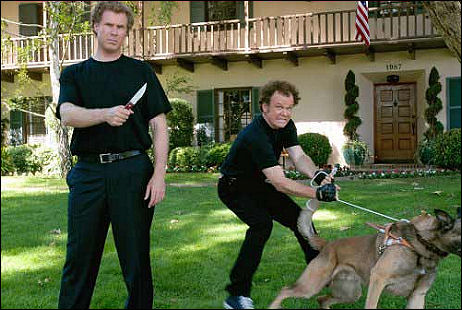
Guys who came out of World War I felt compelled to get down to marriage and raising kids in their early 20s. Then again the F. Scott Fitzgerald/Ernest Hemingway “lost generation” of the 1920s was the first to put stuff off as they wallowed in personal issues. The Depression toughened the nation up and kept almost everyone (except for the Beats of the late 1940s and ’50s) on the straight and narrow until the mid ’60s when all cultural hell broke loose. It was nonetheless considered a mark of at least some shame in the ’70s for anyone to have delayed on Big Life Moves until their late 20s or early 30s.
The state of social devolution has continued unabated since the ’70s, to the point that it’s now considered totally normal for immature guys to kick around well into their 30s and sometimes into their early 40s. Ten or twenty years from now it’ll be considered almost normal for guys to start thinking about coming to grips with maturity when they hit 45 or 50.
The world is culturally devolving, disassembling and swirling down the toilet bowl. That’s why Step Brothers is a downer — it’s essentially a meditation about the end of the world. I’m kind of kidding, yes, but not altogether. Because the world is ending, in a sense. Mamma Mia! is another indicator. Ditto the red-state bumpkins who resent Barack Obama for wallowin’ around in Afghanistan and Europe instead of taking care of business back home.
Another Big One?
The one-sheet for The Day The Earth Stood Still (20th Century Fox, 12.12) implies a massive scale to the visiting alien space craft — a bigger-than-big whoaness. This obviously summons memories (although I really mean “nightmares”) of Independence Day, which is not a good thing for reasons I shouldn’t need to list here. And if (I say “if”) this indicates where the filmmakers are coming from — scary-gargantuan! eerie-cool! — it indicates to me a lack of original vision.
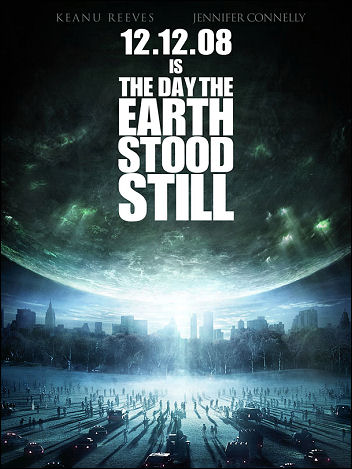
Because they mainly seem to be competing with past alien-visitation films (Close Encounters, etc.) that have used a massive sound-and light show approach to the big landings. In so doing the DTESS guys are obviously trafficking in the usual-usual, which is to try and crank up a not-very-hip crowd that mainly wants to be awed so they can sit in the fourth row with their massive buckets of popcorn soaked in amhydrous butterfat and go “kewwwl!”
What if an alien space ship arrived around noon on a sunny day in an open public place? What if it just showed up and plunked itself down on a big green lawn under a cloudless blue sky without any light-beams puncturing through fog and smoke with the usual wind machines blowing every earthling’s hair? Not cool enough, right? Maybe, okay, but wouldn’t a different sort of landing be more welcome? Something quieter, odder? What if Klaatu’s landing isn’t witnessed at all?
It was reported today by the N.Y. Times Michael Cieply that the Comic-Con crowd gave the DTESS product reel a spirited response “despite a certain amount of web-driven skepticism that has been swirling around the new movie√¢‚Ǩ‚Ñ¢s eco-friendly themes.
“One person who posted earlier this month on imdb.com had demanded to know why ‘would aliens care about the earth√¢‚Ǩ‚Ñ¢s environment unless they intended to use it themselves?’
“Released in the fall of 1951, the original Day the Earth Stood Still was directed by Robert Wise and based on a story by Harry Bates. It cast Michael Rennie as an alien, Klaatu, who had been sent with his robot sidekick Gort to hand earthlings an ultimatum: Live peacefully, or die.
“This time around Keanu Reeves, who plays the Rennie role, is apparently detailed to save the universe from earth√¢‚Ǩ‚Ñ¢s terminal messiness — think of an alien Al Gore, with serious muscle.”
Choppy Seas
Tech Crunch’s Michael Arrington is reporting that “AOL is making across the board budget cuts on its blogging properties, we’re hearing from multiple sources. The cuts range up to 25% of each properties total budget, which falls mostly on personnel costs — bloggers are simply being told to take a couple of weeks off for now, and there may or may not be work for them later in August.” This situation is apparently affecting our good friends at Cinematical to some extent. Editor/critic Kim Voynar says “we’re still operating, we’re undergoing an editorial readjustment, things will be back to normal in a week.”
Appreciated
Thanks very much to amctv.com’s Christine Fall for tributing Hollywood Elsewhere as site of the week in a piece that went up earlier this afternoon. All flattery is welcome. Every little bit helps. Even when there’s no link to the term “site of the week” on the front page. If you go to the main site you have to click on the words “Future of Classic,” which means nothing recgonizable to me.
Unkind Cut
Grand New Party co-author and presumed Republican party stalwart Reihan Salam did a talking-head stint today on MSNBC’s Road to the White House, hosted by David Gregory. Salam is obviously whip-smart, but he has a disapproving scowl that kicks in when he hears something he doesn’t agree with. I’m sorry but he reminded me right away of James Arness in Christian Nyby‘s The Thing (From Another World) with a little touch of Rex Ingram, the genie from The Thief of Baghdad. A bit like an alien studying humans for signs of weakness.
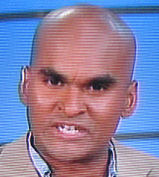
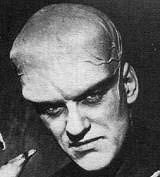
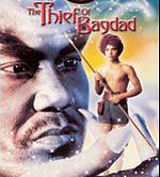
Reihan Salam, James Arness, Rex Ingram
Experiment in Blubber
On July 17th I caught a screening of Blake Edwards‘ Experiment in Terror (1962) at the Aero theatre. It was part of an ongoing Blake Edwards retrospective.
One of the stand-outs was a scene at a public swimming pool. It’s mostly about the then-19-year-old Stephanie Powers, portraying the younger sister of stalker-victim Lee Remick, and some athletic, crew-cut dude chatting poolside. Almost all the people seen swimming and walking around in bathing suits are high-school age or slightly older or younger.
Something about this scene seemed “different” but I couldn’t figure what it was. Then it hit me — all the kids in this scene, which was shot some 47 years ago, were thin, muscular, in good shape. No Jabbas or beefy bods or guys with bigger boobs than some of the girls, which is absolutely what you’ll see today if you go to a public pool or beach. American attitudes about diet and keeping in shape were healthier back then. Kids walked and played more, sat around a lot less, and ate less in the way of chili dogs, ice cream and heaping bowls of Velveeta cheese nachos.
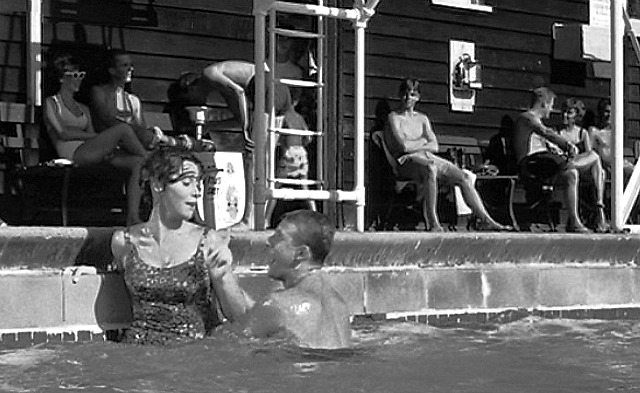
Light Me
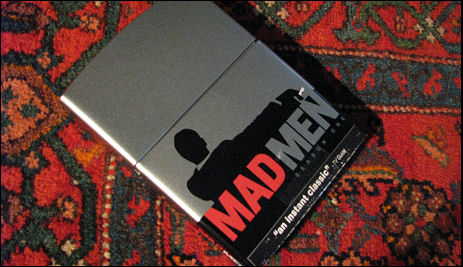
This photo doesn’t convey it well, but the Madmen DVD box set is shaped and even opens like a ’60s-style Zippo cigarette lighter.
Track
Stepbrothers will be the weekend’s big wide-release opener, possibly snagging $30 million or so — tracking at 89 general awareness, 40 definite interest and 19 first choice. X-Files: I Want to Believe is running at 81, 25 and 9…bomb.
The Mummy: Tomb of the Dragon Emperor (August 1) is running at 90, 39 and 9 — showing promise, possibly decent opening. Kevin Costner‘s Swing Shift…I’m sorry, Swing State…I meant to say Swing Vote (also 8.1) is running at 58, 20 and 1 — big trouble.
Pineapple Express (8.6) is running at 47, 37 and 5. (The 8.6 opening is about getting some traction before the Beijing Olympics begin on August 8th.) Sisterhood fo the Traveling Pants 2 (also 8.6) is at 78, 22 and 4.
Tropic Thunder (8.13) is at 59, 33 and 2 — an okay number for now, opening in the middle of the Olympics.
Deadweight
In discussing last night’s release of the new NBC/Wall Street Journal poll, which reported concerns and doubts among Barack Obama‘s qualifications and leadership chops, one MSNBC guest commenter said that “most Americans are just starting to get to know” Obama and that Obama “really hasn’t made the sale yet.” When the subject turned to a possible bump from the Middle Eastern/ European tour, another said “most Americans don’t even know [Obama] is over there now.”
Are Americans living in concrete bunkers located 150 feet underground? I’m constantly shaking my head about the fact that news commentators never acknowledge — aren’t permitted to acknowledge — how deliberately clueless “most” Americans seem to be about political matters. The primary campaign has been going for nearly a year and your typical low-information dolt is still saying “I don’t know who Barack Obama is.”
Said it before, said it again — get rid of the deadweight/dumbass element by making prospective voters take a simple 25-question quiz (in the vein of a driver’s license test) before being allowed to vote. Nothing too difficult or strenuous. Just basic stuff about world events and the price of rice. If they flunk it, they’d be given a chance to take the test again within, let’s say, 7 days. If they flunk that, no vote until the next election cycle.
A democracy can’t function effectively within a society grappling with significant levels of voter ignorance. Voters have to be educated and aware and interested in the process, or the system won’t work.
If I had the power, I would disenfranchise the deadweight classes so fast their heads would spin. At the same time those two American Teen guys would be out of the picture and relegated to the sidelines until they decide to make an effort.
Chopper Blades
The somewhat pretentious-sounding Vietnam movie being made in Tropic Thunder — the one starring the characters played by Ben Stiller, Robert Downey, Jr., Jack Black, et. al. — is called Rain of Madness, which has an obvious Joseph Conrad-ian ring. Here’s a promotional website that includes a trailer and (I think, have been told, haven’t found) a kind of mockumentary about the making of it.
